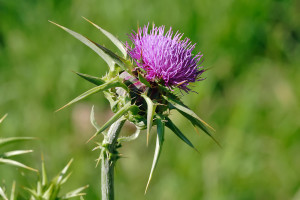Carduus marianus, also known as milk thistle or St. Mary’s thistle, is an annual or biennial herb recognized by its purple flowers and spiny leaves and stems.
Contents
Uses
It is used in homeopathy to treat a variety of medical conditions. The hard-shelled fruit is the only part of the plant that is used for medicinal purposes.
Benefits
Carduus marianus is used in herbal remedies for several other medical conditions that are not liver-related. The herb stimulates the gall bladder and bowels, and promotes urination, which helps to keep kidneys healthy. It also may help to soften kidney stones and gallstones. Psoriasis and other skin conditions also may be improved by using the plant in an herbal remedy.
A home herbal remedy can be made by making a tincture of one part whole, ripecarduus marianus seeds to two parts diluted alcohol. The seeds are steeped in the alcohol in an airtight bottle and left in a cool, dark place for at least eight days. It is then strained, filtered and placed in a clean bottle. About 10 drops in water is taken to promote a healthy liver. The plant extract also is sold commercially for those who do not wish to make their own tincture.
Carduus marianus was used for many years in Europe as a way to increase lactation in nursing women. The belief was that eating a special diet including the herb would greatly increase milk production. The belief had no scientific basis, but legend had it that the white veins on the mottled leaves of the plant represented drops of the Virgin Mary’s milk that fell while she was nursing baby Jesus.
Cautions
Milk thistle extractis LIKELY SAFE when taken by mouth for most adults. Milk thistle sometimes causes a laxative effect. Other less common side effects are nausea, diarrhea, indigestion, intestinal gas, bloating, fullness or pain, and loss of appetite.
There isn’t enough reliable information available to know if milk thistle is safe to apply to the skin or inject into the body.
Special Precautions & Warnings:
Pregnancy and breast-feeding: There is not enough reliable information about the safety of taking milk thistle if you are pregnant or breast feeding. Stay on the safe side and avoid use.
Allergy to ragweed and related plants: Milk thistle may cause an allergic reaction in people who are sensitive to the Asteraceae/Compositae plant family. Members of this family include ragweed, chrysanthemums, marigolds, daisies, and many others. If you have allergies, be sure to check with your healthcare provider before taking milk thistle.
Diabetes: Certain chemicals in milk thistle might lower blood sugar in people with diabetes. Dosing adjustments to diabetes medications might be necessary.
Hormone-sensitive conditions such as breast cancer, uterine cancer, ovarian cancer, endometriosis, or uterine fibroids: Extracts from milk thistle PLANT might act like estrogen. If you have any condition that might be made worse by exposure to estrogen, don’t use these extracts. In contrast, the more commonly used milk thistle SEED extracts do not seem to act like estrogen.
Interactions
- Medications changed by the liver (Cytochrome P450 2C9 (CYP2C9) substrates) interacts with MILK THISTLE
Some medications are changed and broken down by the liver.
Milk thistle might decrease how quickly the liver breaks down some medications. Taking milk thistle along with some medications that are broken down by the liver can increase the effects and side effects of some medications. Before taking milk thistle talk to your healthcare provider if you take any medications that are changed by the liver.
Some medications that are changed by the liver include amitriptyline (Elavil), diazepam (Valium), zileuton (Zyflo), celecoxib (Celebrex), diclofenac (Voltaren), fluvastatin (Lescol), glipizide (Glucotrol), ibuprofen (Advil, Motrin), irbesartan (Avapro), losartan (Cozaar), phenytoin (Dilantin), piroxicam (Feldene), tamoxifen (Nolvadex), tolbutamide (Tolinase), torsemide (Demadex), warfarin (Coumadin), and others. - Medications changed by the liver (Glucuronidated Drugs) interacts with MILK THISTLE
The body breaks down some medications to get rid of them. The liver helps break down these medications. Taking milk thistle might affect how well the liver breaks down drugs. This could increase or decrease how well some of these medications work.
Some of these medications changed by the liver include acetaminophen, atorvastatin (Lipitor), diazepam (Valium), digoxin, entacapone (Comtan), estrogen, irinotecan (Camptosar), lamotrigine (Lamictal), lorazepam (Ativan), lovastatin (Mevacor), meprobamate, morphine, oxazepam (Serax), and others. - Estrogens interacts with MILK THISTLEMilk thistle might decrease hormones in the body. Milk thistle might help the body break down estrogen pills to get rid of them. Taking milk thistle along with estrogens might decrease the effectiveness of estrogen pills.
Milk thistle contains a chemical called silymarin. Silymarin might be the part of milk thistle that helps the body break down estrogens.
Some estrogen pills include conjugated equine estrogens (Premarin), ethinyl estradiol, estradiol, and others. - Medications used for lowering cholesterol (Statins) interacts with MILK THISTLETheoretically, milk thistle might change the levels of some medications used for lowering cholesterol (statins). This could increase or decrease how well these medications work.
Some medications used for lowering cholesterol include atorvastatin (Lipitor), fluvastatin (Lescol), lovastatin (Mevacor), pravastatin (Pravachol), and rosuvastatin (Crestor).
Other names
milk thistle
References
Source: WiseGeek, http://www.wisegeekhealth.com/what-is-carduus-marianus.htm

